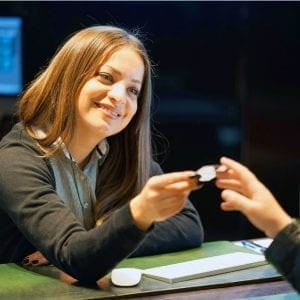 Customer service is an internal and integral part of the processes of every hotel and if there’s any place where customers are likely to be paying attention to the type of service they receive, it’s within the hospitality industry.Ê The job of a hospitality service provider is to maintain customer happiness and satisfaction. Toffler stressed: ‘He who underestimates the revolutionary character of daily changes is living an illusion. The world changes dramatically and irrevocablyÉ’
Customer service is an internal and integral part of the processes of every hotel and if there’s any place where customers are likely to be paying attention to the type of service they receive, it’s within the hospitality industry.Ê The job of a hospitality service provider is to maintain customer happiness and satisfaction. Toffler stressed: ‘He who underestimates the revolutionary character of daily changes is living an illusion. The world changes dramatically and irrevocablyÉ’
At different degrees of intensity, each one of us is marked by a full and complex confrontation, identification, assessment and action process, a process known as change. In this circumstance, change, seen as an improvement of organizational communication, also generates the modification of the image of each tourism unit to third parties.
As experience proves, the quality of customer relationships depend on the way a hotel communicates, both inside and outside. This is the context in which, in order to improve customer relationship management in the tourism and hospitality industry, hospitality professionals should consider crowd-sourcing.
Crowd-sourcing is “a type of on-line participatory activity, in which a person, an institution, a non-profit organization or company proposes to a heterogeneous group of people with different levels of knowledge, through an open and flexible call to voluntary undertake a task of variable complexity and modularity…”
The advantage of crowd-sourcing will be mutual. The user will receive the satisfaction of a particular type of need (i.e. economic or social recognition, self-esteem, etc). The crowd-sourcer will obtain and use, for their own interest, all information provided by the user.
Crowd-sourcing is a compound of the concepts crowd and outsourcing . The suffix ‘-ing’ is a form of emphasizing the importance of continuing the approach initiated at managerial level and underlines the need to obtain the final result from the contribution of a large number of people outside the organization.
Outsourcing services through crowd-sourcing uses on-line platforms (such as Amazon Mechanical Turk, Crowdsprings, etc.) and its addressability range includes, in a competitive regime, persons and/or groups and not collaborators or contractors, as in the case of outsourcing. Its transfer to the Internet was strengthened by the reality that natural persons tend to manifest more freely on a specialty website, feeling much safer without supervision.
By crowd-sourcing, hoteliers:
- Reduce costs: Performers of outsourcing activities are paid in unit rates which are lower than that of employees.
- It is an excellent source of inspiring the entrepreneurial phenomenon and an attractive way of encouraging and manifesting it (especially in SMEs).
- It is a brilliant way of stimulating the improvement of CRM processes.
- It is beneficial at an individual level as well, since those who use it are twice as motivated.
Crowd-sourcing is a new option for customer relationship management to conceive and conduct business in the tourism and hospitality industry, not only based on tradition and/or the management experience of units in the field, but also based on feedback offered by those who are direct beneficiaries of the services offered: the clients.
The aim is to improve customer relationship management in hotels with priority from information from guests. This is a way perceiving and treating them, not as mere consumers of products and/or services, but as clients, whose loyalty, results from a better understanding of their wishes and/or needs which can significantly contribute to increases performance.
In 2013, Marriott launched its Travel Brilliantly campaign, which invited guests to express their suggestions for improving their hotel experience on a variety of digital platforms. They smartly used these ideas and insights to refurbish numerous global hotels. This crowdsourcing campaign enabled Marriott to understand what Millennials really wantedÊ and it also delivered numerous new ideas to meet Millennials’ modern-day needs.
Unfortunately, the general perception on the interest of tourism units in having significant feedback from their own clients is unfavorable. Most people who participated in crowdsourcing say they are convinced that they have been simply ‘interviewed’ statistically and that they feel they were being treated not as clients, but rather as mere consumer ‘tourists’.
By using crowd-sourcing as a main feedback form in order to get a true opinion of a hotel’s guests, managers can get extremely useful information in order to improve their own activity.
Crowd-sourcing is a new era in customer involvement. Numerous analysesÊindicate how customers expect to be involved – they want to feel part of the company and this will be the way they will choose which company to take the service from. Companies can involve their own users in a controlled and pioneering way. By crowd-sourcing customer service, they may involve expert customers and Internet users to leverage their expertise providing support to other users. Support provided by passionate expert users guarantees high quality and while customer satisfaction grows, support costs are drastically reduced.
With customers gaining voice through social media, enterprises can take advantage of crowdsourcing for business improvements. Attracting fresh ideas, solutions and expectations from current customers, it can help employees across the organization provide the innovation and interactive relationships that a growing number of customers now expect. Integration of CRM and crowdsourcing is sure to increase idea generation and amity within the businesses that use it. This signifies that CRM will no longer be just for lead generation and marketing, it will also provide a foundation for new innovation.
About the author
 Philia Tounta has been working in the tourism sector for 21 years. She has worked in various hotels, travel agencies and unions in Greece and abroad. She has acquired an MBA degree in the UK, a Bachelor degree in Athens and a Diploma in Tourism. She speaks English, French, Spanish and Italian and she is a member of TIES, HTS, Bedposts, etc. She has attended numerous seminars and workshops concerning tourism and small business management.
Philia Tounta has been working in the tourism sector for 21 years. She has worked in various hotels, travel agencies and unions in Greece and abroad. She has acquired an MBA degree in the UK, a Bachelor degree in Athens and a Diploma in Tourism. She speaks English, French, Spanish and Italian and she is a member of TIES, HTS, Bedposts, etc. She has attended numerous seminars and workshops concerning tourism and small business management.
Nowadays she lives in Athens and she is a General Manager ofÊApokoros Club Hotel & Villas, Craft Deco & ActivitiesÊin Crete Greece, a Customer Service Officer atÊThamiris Hotel(s) Crete, and sales manager at ÒCrete focusÓ and ÒYou planetÓ.
She is a Hospitality & Tourism consultant for small medium sized hotels (ÔHotelice’), a Tourism Ambassador in the Hellenic Tourist Society, a provocateur in seminars and she is occasionally speaks at conferences concerning tourism. She is a freelance author to various online international and local blogs. Often she participates in discussions in Greek radio channels and has been interviewed by various journalists from abroad concerning tourism issues.















